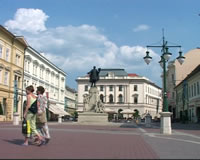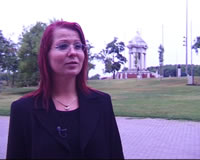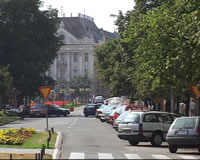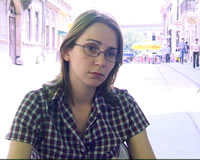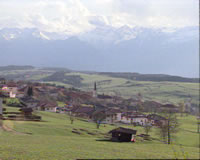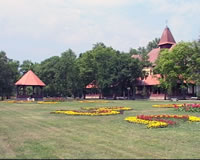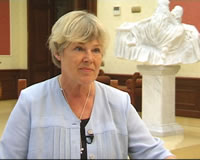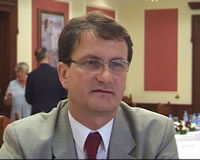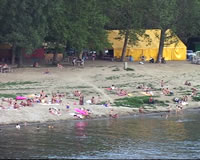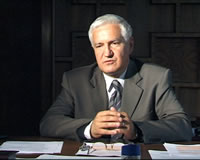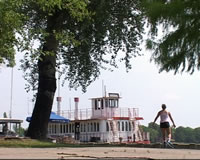ILLUSTRATION SHOTS
General views in the European Parliament in Strasbourg, flags, hemicycle
MEPs talking together
Joost Lagendijk (NL) in the picture
INTERVIEW
Joost Langendijk, MEP, The Netherlands On the EU's role in the dialogue between Belgrade and Pristina: `The present situation in Kosovo doesn't really favour dialogue but I think it's really up to the EU to put maximum pressure on both sides, at least to get together and to try and see what is possible and I am saying that because I think that is the only possible solution. I don't see any other solution neither to continue the present situation with no dialogue and then hope for the future or that the EU makes up a plan of its own without the two sides being involved, so this is the only formula that can work but it will be extremely diffocult in September with the situation as it is now to strat off but I think really the EU has to put all efforts into this dialogue, into these talks because again it 's the only way out. ` On the duration of the dialogue `I think it 's pretty hard to predict how long it will take. I mean it's clear, it's very difficult so it won't be one or two months. On the other hand, I can't imagine that these talks will drag on for years. I am thinking myself that within a period of one year it should be clear what are the possibilities. You don't have to be a magician or a scientist to see what really are the possibilities. This has been put on paper before by all kinds of think-tanks in the past so the possibilities should be clear, I think, within, maximum one year. Will the EU military force stay in Macedonia? Yes, I do think that the EU will stay for two reasons: one is that the Ohrid agreement is so crucial in stabilising the whole region, not only Macedonia, but if Ohrid fails and the whole Albanian problem will/could explode, second is that, as you may know, the presence of the EU in Macedonia has a high symbolic value for this new EU security policy and it would really be a disaster for this new policy when for the first time when problems arise, the EU would draw back and show that it 's not able to cope for the problems, so I think for that reasons the EU will do its utmost to prove that it can do a military and security job in the Balkans on the borders of the EU and show that this new EU Security Policy is really a substantial thing and not only something on paper where , which disappears if there are problems. So I think that for that reason the EU will be willing to invest a lot of energy and time and money in staying in Macedonia and trying to stabilise the country. Shots of MEP Hannes SWOBODA (Austria) with Joost Lagendijk INTERVIEW
HANNES SWOBODA (MEP AUSTRIA) On the Serbia-Kosovo dialogue `The fact that the positions are far away from each other on the Serb side and on the Albanian side is not a problem, because otherwise you wouldn't need talks, but violence is a problem. Violence is a problem, and the attitude of some Albanians thoughts that hang in the. I think the Albanians are not yet ready to accept that the violence is not only hurting the Serbs, killing even young people, but is killing the hope, let' say, for an independent Kosovo. Unless that is clear for the Albanians in Kosovo, negotiations cannot start and , anyway,they cannot proceed and I cannot see that the Serbs are ready to go to negotiations unless they have made it very clear from the Albanian side to do whatever they can to prevent that kind of violence.`
Well, I think we have to learn form other regions, regions which are more crisis regions, like the Middle East. Only to define steps and roadmaps is not enough, you have to clearly define the final status and I cannot imagine anything else than the final status of an independent Kosovo but a multiethnic Kosovo, a Kosovo which is able to protect all its citizens and its interest is to protect all its citizens, that is Albanians, Serbs and any other kind of minority and that,of course, has to be proved before, one cannot wait and first -rate independent Kosovo and then, `let's see` ,and that, of course, has to include a vital influence of the Serb, Yugoslav, no, Serb government concerning the future of its minority. If these talks are accompanied by positive measures by the majority, by the Albanian speaking majority in Kosovo, …………….it must be a real change in the whole atmosphere, unless that change is done, even to start talking is not of much help .
On the EU military mission in Macedonia Well, for the moment, there is peace, there is calm, and theoretically one can stop on the 15 December. In practice I would not advise to do so, because the situation is calm for the moment but there is no long run stability already reached and, therefore, I think it would be good for the country if the Mission is continued and it 's good for the EU if they have some more practice and training in the military Mission, at the place. So, because of that a bit unsecure, unsafe, not finalized stability in Macedonia I would advise to stay there at least for about another year. SHOTS OF DORIS PACK, MEP (Germany) INTERVIEW
DORIS PACK, MEP from GERMANY There is really a big lack between both sides but they have to feel it.They have to speak together because as long as the final status in Kosovo is not defined,there will not be peace in the region, even for Macedonia, so I think they should really come together and the new High Representative there, Mr. Holkeri, should really press them to come together. But, on the other hand we see that although in Kosovo there is still ongoing murdering against the Serb population and that is not helpful, I cannot understand that Serbs do not want dialogue at this moment but I think they should overcome the present situation. I don't know how long it will take with this dialogue but it has to start once and then it is difficult to convince one side or another side of the right way. What the right way is, is not so clear. For me it's clear that they don't want, that they can't come once again under the Serbian authority, they cannot become members of the Serbian state, but I think they understand because there was a time when they have been in this situation and I think they should have a possibility to run their own affairs but they have to respect the fact that the part of the citizens of Kosovo are not Albanians, are Serbs, mostly Serbs, some Romas, some others, and I think as long as they don't face this situation seriously they cannot have our support to become independent. On the EU military mission in Macedonia It 's our first common mission and I think we are ready to stay there and even to intervene if it is necessary. And I think in this moment it's not the best moment to speak on the end of the mission . Unfortunately, the government asked for the end of this mission. But I think ………………that the Mission is longer than the end of this year. We are ready to stay , I presume, but it's up to the government to accept. |
 Facebook
Facebook Twitter
Twitter

